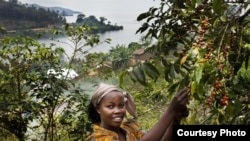Smallholder farmers will be the focus of an international conference taking place in Addis Ababa this week. The event, “Making the Connection: Value Chains for Transforming Smallholder Agriculture,” is expected to draw over 400 participants from around the world. They will gather together for the week-long conference to share examples of what new agricultural techniques are working in the developing world.
Michael Hailu is director of the Technical Center for Agricultural and Rural Cooperation, CTA, based in the Netherlands. Speaking from Addis Ababa, Hailu said that since the 2007-2008 global economic crisis a lot of interest has been shown in boosting agricultural production in developing countries. He said this conference will focus on improving the value chain of the smallholder farmer.
“The goal of this conference is to bring together people from around the world who are working on improving agricultural value chains. The whole idea is to facilitate how smallholder farmers in developing countries can be integrated into global and regional markets, so that they can get better value for their produce,” explained Hailu.
Hailu said while improving productivity is very critical, that by itself is not enough to sustain the livelihoods of smallholder farmers.
“If farmers are not very well integrated into market, they can produce sometimes excess products that could be spoiled because there is not a direct access to market. They can’t sell it easily,” said Hailu, who went on to say, “the whole approach to value chain is to make sure that farmers can produce to meet specific demands. And they will have a clear and well-articulated market that they could sell to.”
Hailu said the smallholder farmers make up the majority of farmers in Africa and other parts of the developing world. They are responsible for producing about 80 percent of what is generated in developing countries. They are mostly family farms that produce for their own families, but also take a certain amount of excess to market.
Hailu also pointed out that most of the food produced in Africa is produced by smallholder farmers who are women.
To listen to the entire interview, please click on audio.
Michael Hailu is director of the Technical Center for Agricultural and Rural Cooperation, CTA, based in the Netherlands. Speaking from Addis Ababa, Hailu said that since the 2007-2008 global economic crisis a lot of interest has been shown in boosting agricultural production in developing countries. He said this conference will focus on improving the value chain of the smallholder farmer.
“The goal of this conference is to bring together people from around the world who are working on improving agricultural value chains. The whole idea is to facilitate how smallholder farmers in developing countries can be integrated into global and regional markets, so that they can get better value for their produce,” explained Hailu.
Hailu said while improving productivity is very critical, that by itself is not enough to sustain the livelihoods of smallholder farmers.
“If farmers are not very well integrated into market, they can produce sometimes excess products that could be spoiled because there is not a direct access to market. They can’t sell it easily,” said Hailu, who went on to say, “the whole approach to value chain is to make sure that farmers can produce to meet specific demands. And they will have a clear and well-articulated market that they could sell to.”
Hailu said the smallholder farmers make up the majority of farmers in Africa and other parts of the developing world. They are responsible for producing about 80 percent of what is generated in developing countries. They are mostly family farms that produce for their own families, but also take a certain amount of excess to market.
Hailu also pointed out that most of the food produced in Africa is produced by smallholder farmers who are women.
To listen to the entire interview, please click on audio.




